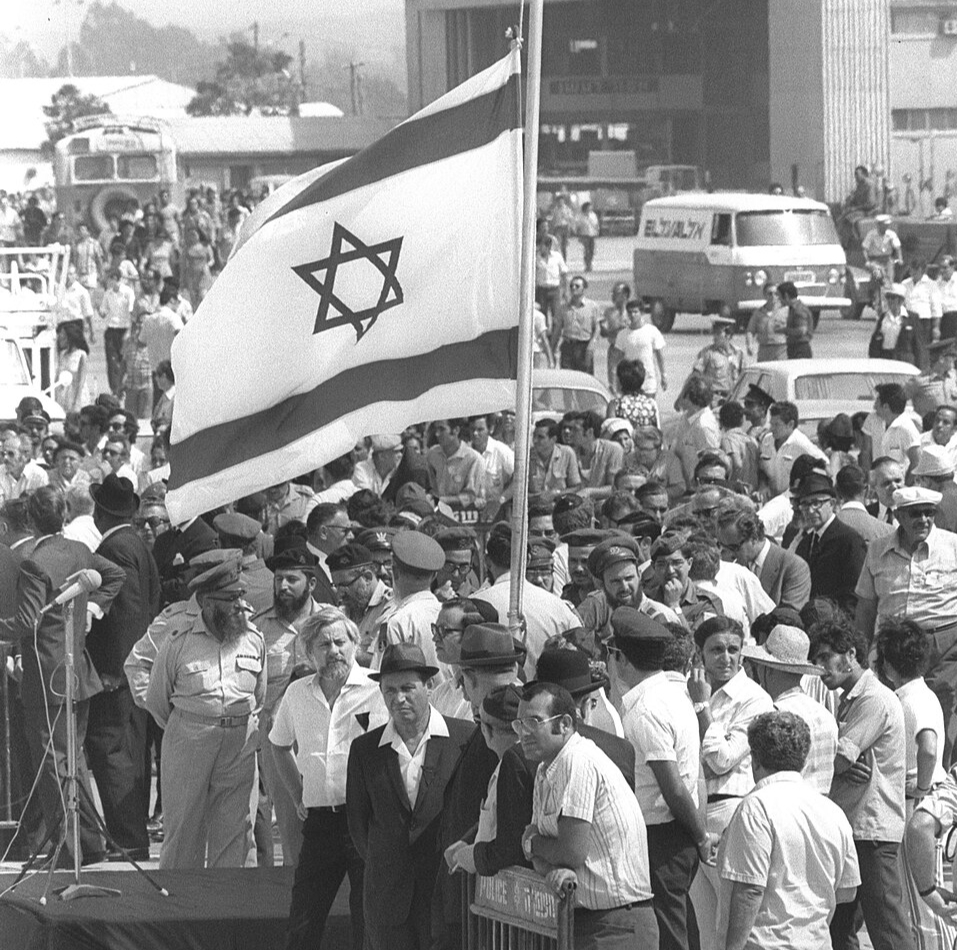The 1967 War and the Birth of International Terrorism
Editor's note: This post is also part of a series in the Brookings Foreign Policy Program on the legacies of the 1967 war.
***
Published by The Lawfare Institute
in Cooperation With

Editor's note: This post is also part of a series in the Brookings Foreign Policy Program on the legacies of the 1967 war.
***
Among the many children of the Six-Day War, the most frightening is international terrorism. Of course, terrorism, including Palestinian terrorism, predated 1967, but the war changed its scope, scale, and very nature. Before the war, Palestinian terrorists struck at targets in Israel, often in cooperation with neighboring states. After the war, the Palestinians used terrorism to internationalize the conflict, hijacking and destroying airplanes, holding diplomats hostage, and even attacking Israelis at the 1972 Munich Olympics.
Terrorism expert Bruce Hoffman dates modern international terrorism to July 22, 1968, when the Popular Front for the Liberation of Palestine (PFLP) hijacked an Israeli El Al flight traveling from Rome to Tel Aviv. From 1968 through 1976, Palestinian groups would hijack 16 airplanes, and also attack other aviation targets such as El Al offices. Hijacking was not new, but most hijackers had simply sought to divert a plane to Cuba or another desired location. This time the hijackers sought to trade the passengers for Palestinian terrorists imprisoned in Israel and proclaimed that a civilian jet was a legitimate target because it was a symbol of the Israeli state. This combination of extra-territoriality and claims that civilian targets are legitimate because they are symbolic would spread, leading to more and more Palestinian hijackings and increasingly becoming the norm among terrorist groups. Global targeting would also spread beyond hijacking. Most dramatically, in 1972 the Black September Organization, a front for Yasser Arafat’s Fatah, killed eleven Israeli athletes and a German policeman at the Munich Olympics, capturing the attention of the world media that had gathered for the games.
This shift to international terrorism flowed directly from the profound changes wrought by the 1967 war. Before 1967, many Palestinians assumed they would gain their own state on the backs of Arab armies. Arab states, after all, had warred with Israel in 1948 and 1956, and their leaders promised deliverance for their Arab brothers. The crushing Israeli victory dispelled that illusion and made Arab leaders cautious about confronting Israel, fearing another devastating loss. In addition, the war damaged the prestige of Egypt’s Gamal Abdel Nasser and his pan-Arab agenda. Abu Iyad, Arafat’s chief lieutenant who would go on to run the Black September Organization, recalled: “Nasser had surrendered! Who could ever have imagined such a thing?” If the Palestinians were to gain deliverance, they would have to deliver it themselves.
In a major shift, the Six-Day War also gave Israel control over the West Bank and Gaza Strip. After 1948, roughly one million Palestinians remained in Israel, but they were a leaderless minority. Now Israel ruled over large Palestinian-populated areas, occupying them militarily. Yasser Arafat sought to emulate the successful Algeria revolt, where guerrillas eventually drove out the French after more than one hundred years of colonization—a model for many revolutionary movements at the time. Israel, however, quickly suppressed an attempted Palestinian rebellion on the West Bank and, in the years that followed, crushed resistance in Gaza. Abu Iyad later concluded that his own organization’s carelessness and the skill of Israel’s intelligence services was too much.
The Palestinians also continued cross-border attacks, often using bases in Jordan to strike into Israel. At first these attacks and the Israeli response won Palestinian movements like Arafat’s Fatah plaudits among young Arabs, as they appeared to be the only group effectively fighting Israel after the 1967 humiliation. But as Israeli defenses improved, world media paid less and less attention to the low-level back and forth between Israel and the Palestinians. The number of cross-border operations peaked at almost 1,500 in 1968 but plummeted to less than 200 by 1972. Israel also hit Jordan itself hard in order to press the government to crack down on the Palestinian presence. These efforts precipitated a bloody crackdown, which the Palestinians referred to as “Black September,” in which an estimated 2,000 Palestinians died and thousands were expelled by the Jordanian regime, leading to mass influxes to Lebanon, with eventual dire consequences for that country.
It was this lack of options that made international terrorism so attractive or, more accurately, the alternatives so unattractive. As the PFLP’s operational mastermind, Wadi Haddad, argued, “This is a particular animal, the IDF; we cannot fight it plane for plane, tank for tank, soldier for soldier.” International terrorism was cheap and easy. It did not require massive military forces or broad popular support but rather a small group of committed and elite members. And when it first broke out in 1968, the world was not prepared. Passenger information, metal detectors, and other basic security measures were usually lacking. As Leila Khaled, the charismatic PFLP hijacker recalled, “you just show your passport and pass by.”
International terrorism both succeeded and failed as a strategy for the Palestinians. On the one hand, it did gain world attention and put the Palestinian cause on the international agenda. George Habash, the head of the PFLP argued that “To kill a Jew far from the battlefield has more effect than killing a 100 of them in battle.” The PLO’s UN observer noted that the “hijackings aroused the consciousness of the world and awakened media and world opinion much more – and more effectively – than 20 years of pleading at the United Nations.” Haddad made a similar argument, noting the hijackings and other operations would cause pain to Israel and, grab world attention, and in the end the world will “decide it has to do something about Palestine. It will have to give us justice.” Inspired by these dramatic acts, young Palestinians rushed to join militant groups. By the end of the 1970s, the PLO had more embassies than Israel did. Not surprisingly, groups as disparate as the Armenians and the South Moluccans would try to emulate the Palestinians.
Yet even as this strategy made it more likely that the Palestinians would get to the negotiating table, it made it harder for them to strike a deal. Understandably, Israel was less willing to negotiate with groups that used terrorism than with other enemies – Israel had fought wars with Egypt, Jordan, and Syria, but negotiating with them was more palatable than negotiating with Arafat. (The United States, too, currently supports the Afghan government’s negotiations with the Taliban but rightly opposes any with Al Qaeda.) So when Arafat finally made it to the negotiating table in the early 1990s, his Israeli counterparts viewed him with suspicion, and much of the Israeli public with loathing.
One lesson to draw from the Palestinian experience concerns the interplay between a people’s deep ambitions and the strategic options available to its members. The Palestinians wanted their own state, and though their fortunes have waxed and waned since 1967, this goal endures – and, indeed, is now accepted as legitimate by a majority of Israelis. When their preferred approaches failed, they did not abandon their goal but found other means to pursue it. For groups in general we should expect that when other options fail they might turn to terrorism, seeing it as an option among many.
Having a viable peaceful political option is thus vital. Otherwise, when one violent method is defeated or blunted, another may arise in its place.




